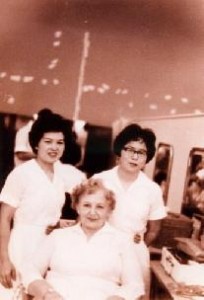Hiroshima Girls, Part 1: Life in Canada [4]
Jul. 3, 2010
Beautician's license provides path to independence
by Masami Nishimoto, Staff Writer
This feature series on the "Hiroshima Girls," also known as "Hiroshima Maidens," is a close look at a number of Japanese women who were impacted by the atomic bombing of Hiroshima. The series was originally published in 1996.
In a series that ran in the women's magazine "Fujinkoron," starting with the New Year issue of 1957, top film star Hideko Takamine interviewed "People in the News."
The first article in the series featured Misako Kannabe, now Misako Tachibana, 66, as "a Hiroshima Maiden who returned from America last November after undergoing surgery."
Takamine: How do you feel about getting married?
Kannabe: I'll be ready to get married when I meet someone whom I respect. But before that, I must become independent.
Ms. Tachibana, then 26, shared her plans for the future, saying, "I'm thinking of going to Tokyo to study at a school for beauticians using the educational funds I have been given." The Quaker host families in the United States had presented each woman with 300 dollars (the equivalent of 108,000 yen then) when they left to return home to Japan. In those days, the average male university graduate earned a monthly salary of just 10,000 yen.
After regaining her courage to live while in the United States, Ms. Tachibana's dream of becoming independent was beset by an obstacle from the very start. The school she applied to, to become a beautician, rejected her application when they learned of the injuries she incurred in the atomic bombing. But, she said, "That actually worked to my advantage. I braced myself, and became determined to never give up."
With the resolve to succeed, she was able to enroll at the Arden Yamanaka Beauty Academy, considered at that time to be one of the top such schools in Tokyo. Toyoko Yamanaka, 87, principal of the school, had opened a shop in prewar Los Angeles, and her parents happened to be exposed to the atomic bombing in Hiroshima.
Ms. Tachibana earned the highest mark of "A+" in the two-year program, and was absent nine days. After gaining her beautician's license, her long-sought ambition, she was asked to remain at the school as a teacher.
From time to time letters arrived from her "Papa-san" and "Mama-san" in the United States. When she told them about her growing dream of studying in America, they responded that they would be happy to welcome her back in their home.
In 1960, she returned to the United States and enrolled in the language school for international students at Columbia University. "I got up at four in the morning to do my homework, but I couldn't finish it. It was so hard," she recalled with a wry grin.
To live up to the financial support she received for her education, Ms. Tachibana, while working as a babysitter and at other part-time jobs, studied at a vocational school and at a beauty school operated by a major cosmetics company. She learned the latest skills involved in shampoos and perms, and two years later, obtained her beautician's license for New York State.
Out on the street, she passed by people of all different races and felt an indescribable thrill of liberation. Above all, she was never gawked at because of her scars. After getting her student visa changed to a vocational student visa, she worked for two more years at a beautician's shop run by a Japanese-American. When she provided a manicure while a customer's hair was drying, she received a tip of five dollars (1800 yen at the time).
"It was a happy time for me," she said, "because I was able to concentrate on my favorite type of work."
When Ms. Tachibana came back to Japan after a stay of four years in the United States, Japan was at the initial stage of its economic boom and the nation was elated by the opportunity to host the 1964 Olympic Games in Tokyo. However, at the end of the year, her mother Mayumi, who had fretted over her daughter's future, passed away at the age of 58 in Hiroshima.
"I caused my mother so much anguish when I was young and I think that shortened her life," she said. "I was full of regret." Seeking to make amends for her unfilial behavior, she built a grave for her mother with the money she saved in the United States.
Although Ms. Tachibana's father did not mention it directly, he naturally wanted his youngest daughter to open a beauty shop in their hometown of Hiroshima. But instead, she was offered the post of head of the beauty shop attached to her former school in Tokyo. She threw herself into her job there and was always requested by international customers, partly because of her English ability.
One day, a notice in a beauty magazine happened to catch her eye: "Accepting skilled immigrants." And the embassy of the country featured in the notice, Canada, was just around the corner from her shop in Tokyo.
(Originally published on June 20, 1996)








